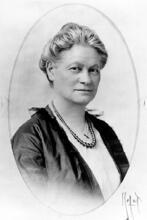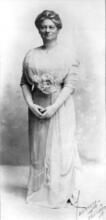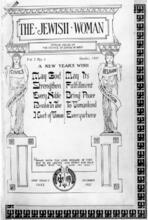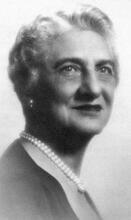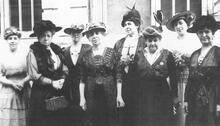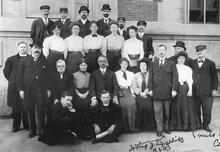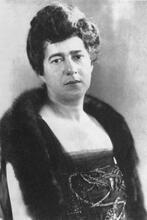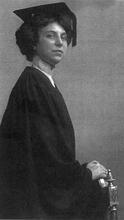Lizzie Spiegel Barbe
Lizzie Spiegel Barbe volunteered her energies to the National Council of Jewish Women and a variety of other causes in the Chicago area. Barbe became involved in the Jewish community and the social circle of ladies’ clubs that devoted themselves to charity work. She was an elected officer of the auxiliary of Hebrew Union College and served as president of the Industrial School of Sinai Temple, which educated immigrant children. She also served as president of the local lodge of the United Order of True Sisters, a precursor to NCJW, from 1892 to 1917 and briefly served as president of the Chicago section of NCJW from 1902 to 1905. In 1895, she became the first president of the Conference Committee of Jewish Women’s Organizations.
Lizzie Spiegel Barbe, a member of a prominent Chicago family, devoted more than fifty years of her life to being a clubwoman and leader within the Chicago Jewish community. Throughout the later years of her life, Barbe was repeatedly recognized as an important asset to the leadership of the Jewish community in Chicago. As a consequence, she was made an honorary member of almost every organization with which she had ever been associated.
Early Life and Family
Lizzie T. Spiegel was born on October 30, 1856, in East Liberty, Ohio. Her mother, Caroline Frances Hamlin, an American Quaker, married her father, Marcus Spiegel, a German-American Jew, in a civil ceremony in Alliance, Ohio, in 1852. After their marriage, the couple temporarily relocated to Chicago so that Lizzie’s mother could prepare for her conversion to Judaism, a ceremony that was uncommon in that era. Caroline Hamlin Spiegel was the first person to convert to Judaism in the City of Chicago, on August 21, 1853.
Lizzie and her four siblings were born in Ohio. Her father was a dry goods businessman and a famous Union colonel in the Civil War. In 1864, Marcus Spiegel was killed during an ambush aboard the City Belle on the Red River in Louisiana. Had Marcus Spiegel survived the war, it is likely that he would have followed his plan to open a store together with his brother Joseph. The store that Joseph Spiegel opened after the Civil War eventually became the Spiegel Catalog Company.
After her father’s untimely death, Lizzie’s family was supported by relatives in Chicago and Ohio. When she lived in Chicago, Lizzie became part of the Reform Jewish community and was influenced by the progressive and liberal leadership of Dr. Emil Hirsch (1880–1923), the rabbi of Sinai Congregation. She was also affected by the leading role that the Spiegel and Greenebaum families had in organizing Jewish communal life in Chicago. Hannah Greenebaum Solomon (1858–1942), the founder of the National Council of Jewish Women (NCJW), was her first cousin and lifelong friend. (Hannah’s mother, Sarah Speigel Greenebaum, was Marcus Spiegel’s sister and Rose Haas Alschuler (1887–1979) was one of Lizzie’s cousins).
Lizzie Spiegel married Martin Barbe, a wholesale clothing businessman, in Chicago on October 4, 1876. They had four children, Ella Rachel (1877–?), Alfred Marcus (1879–1959), Myrtle Agnes (1880–1944), and Walter Spiegel (1883–1967). Lizzie was widowed in 1914 and it is not known how she supported herself after her husband’s death.
Philanthropy and Advocacy
During the early years of her marriage Lizzie worked as a volunteer for the sewing society and was an elected officer for the Auxiliary of the Hebrew Union College. She also was president of the Industrial School of Sinai Temple, the predecessor of the Jewish Training School. Barbe remained president of this institution, which educated immigrant children, until she felt that her sex limited her effectiveness as a leader.
In addition, Barbe addressed the needs of the Jewish immigrants in Chicago through her continuous participation in the Johannah Lodge No. 9, the first lodge of the United Order of True Sisters to be established outside the East Coast. This organization is the oldest national Jewish women’s organization predating the NCJW. Barbe was financial secretary for one year and president for three terms—1892–1895, 1906–1909, and 1914–1917.
Barbe’s name can also be found in many of the early records of the Jewish Women’s Congress, the historical gathering of Jewish women at the Chicago World’s Fair of 1893, and the NCJW. Barbe was a member of Hannah Greenebaum Solomon’s committee for the Jewish Women’s Congress. This group was responsible for inviting and organizing delegates from throughout the United States. In addition to her committee work and being a founding member of the NCJW, Barbe was the third president of the Chicago section of the NCJW from 1902 to 1905, held positions on the national executive board, and attended almost all of the triennial meetings during her lifetime.
Barbe was a driving force in the creation of Council Camp—a summer vacation camp for Russian Jewish immigrants established by the Chicago section of the NCJW. For over thirty years she focused her attention on the administration of this camp. Barbe also helped young Jewish immigrant girls through her work as a board member for the Miriam Club.
Records indicate that Barbe became the first president of the Conference Committee of the Jewish Women’s Organizations in 1895, was Chicago Sinai Temple Sisterhood President from 1917 to 1925, was a member of the National Executive Board of the National Federation of Temple Sisterhoods from 1923 to 1931 (now called the Women of Reform Judaism), and in 1918 became the first president of the Women’s Auxiliary Board of Michael Reese Hospital (later named the Woman’s Board of Michael Reese Hospital and Medical Center).
Lizzie Spiegel Barbe represents the “Jewish Clubwomen” of the nineteenth and early part of the twentieth century. Like other “Jewish clubwomen” of this era, Barbe was motivated to establish leadership roles for women within the organized Jewish community such as had previously not existed. All of Barbe’s communal work focused on the Jewish sphere, and she is remembered for her lifelong commitment to the Chicago Jewish community.
The American Jewish Year Book 1905–1906.
The American Jewish Year Book 1944–1945.
Barbe, Lizzie Spiegel. Unpublished Memoirs. (1943).
Bornstein, Sandra K. “Lizzie Spiegel Barbe.” In Women Building Chicago 1790–1990 edited by Rima Lunin Schultz and Adele Hast. Bloomington, Indiana: 2001.
Braun, Mildred L. “A History of Johanna Lodge No. 9 United Order of True Sisters” (1955) (available at the American Jewish Archives).
Byrne, Frank L. and Jean Powers Soman. Your True Marcus. Kent, Ohio:1985.
Elwell, Ellen Sue Levi. “Founding and Early Programs of the National Council of Jewish Women; Study and Practice of Jewish Women’s Religious Expression.” Ph.D. diss., Indiana University 1982.
Golumb, Deborah Grand. “The 1893 Congress of Jewish Women: Evolution or Revolution in American Jewish Women’s History?” American Jewish History 70 (September 1980).
Hart, Sara. The Pleasure is Mine. Chicago: 1947.
Meites, H.L. History of the Jews of Chicago. 1924 facsimile edition reprinted. Chicago: 1990.
Rogow, Faith. Gone to Another Meeting. Tusculoosa, Alabama: 1993.
Solomon, Hannah Greenebaum. Fabric of My Life. New York: 1946.
Solomon, Hannah Greenebaum. Hannah Greenebaum Solomon Scrapbook. Available on microfilm at the American Jewish Archives.
Archival Information was also obtained from the following places:
Papers for the National Council of Jewish Women Chicago Section—(A small collection found at the Chicago Jewish Historical Society and the American Jewish Archives. The main collection is located at the Library of Congress).
The Chicago Jewish Archives houses the papers from the Johanna Lodge No. 9, the Conference of Jewish Women’s Organizations, the Women’s Auxiliary Board of the Michael Reese Hospital and The Jewish Training School.
The American Jewish Archives has the Sinai Collection and an assortment of documents from the National Federation of Temple Sisterhoods.
The office of the Women of Reform Judaism in New York City has retained a small archive. A handful of documents from Sinai Congregation can be found at the Chicago Historical Society. The descendants of Barbe have reconstructed their family genealogy and they also have saved a small number of papers and pictures.

